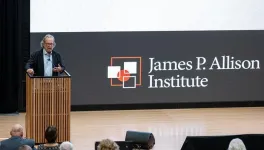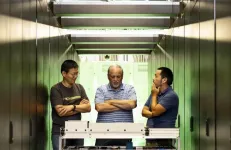(Press-News.org) A plentiful source available for carbon-free electric power in New England states is hydroelectric dams across the border in Canada. But getting that power into the Northeast has hit political headwinds.
Ryan Calder, assistant professor of environmental health and policy in the Public Health Program within the Virginia-Maryland College of Veterinary Medicine, is the principal investigator in a $650,000 grant from the Environmental Protection Agency (EPA) for research on how divides might be bridged in order to accelerate decarbonization of New England’s power grid in light of differing community values.
The problem
Two high-profile projects to extend transmission lines from Canadian hydroelectric dams to New England, often following existing rights-of-way, have been canceled in the past five years after opposition from community members and environmental interest groups opposed to aesthetic and other impacts. In each case, development was suspended after years of study, millions of dollars of investments, and approval by regulators.
Often, that opposition came from groups or individuals who also oppose both carbon-burning forms of electric generation and other sources of renewable power that have varying impacts, leaving no viable choices. Canadian hydroelectric power had been found by engineers to be a preferable course of action among a variety of options.
Calder said the resistance in the Northeast mirrors what has happened in other states, where decarbonization has been slowed by community opposition to renewable energy.
“There’s some disconnect between what we identify on the technical side as the optimum solution after we've compared all the options,” Calder said. “On the one hand, that answer satisfies engineers and state policymakers. And then on the other hand, there's the inconvenient matter of the values and opinions of the people who might be affected by these decisions. And when those two collide, no one wins because there’s no progress being made in any direction.
“If we don’t build the infrastructure for renewable energy, fossil-fired plants won’t go offline and will continue to spew greenhouse gases and particulate matter and other pollutants, increasing the local burden of disease and contributing to global climate change,” Calder said. “It is easy to oppose new infrastructure based on real or perceived impacts. Yet, no one is presenting a buffet of renewable energy alternatives, as compared to the status quo, and asking people to pick based on the different impacts and benefits of each option.”
The study
The EPA grant will fund two interlocking studies.
One is integrated modeling, in which many scenarios for how electrical generation and transmission proceed in the future will be played out on computer models – in essence, creating the buffet of possible options from which engineers, political leaders, and the public can choose. Each scenario will be linked to environmental, economic, and health outcomes.
“The one side is on mathematical modeling, in which we create computer simulations of what this would mean for ecological endpoints, human exposures to contaminants, greenhouse gas emissions, and economic impacts” Calder said.
The second study is deliberative valuation, a process to characterize and interpret community values surrounding decarbonization and potential impacts.
“Results are expected to guide decision-making by revealing decarbonization pathways consistent with community values and uncovering what types of information develop support for projects with large net benefits,” Calder said.
Groups will be convened from various communities, both urban and rural. People enter with their own individual evaluations, but during a workshop must arrive at a consensus about the values of the community as a whole in the context of tradeoffs. In the process of deliberating, individuals can ask experts and each other questions.
“They go through this whole process, and they converge on a ranking,” Calder said. “And we repeat this process many times with different groups to see if the values that they converge on are stable and whether there are differences across groups, for example, urban versus rural communities.”
Georgia Mavrommati, an ecological economist at the University of Massachusetts-Boston, guides the deliberative valuation study. Richard B. Howarth, chair of environmental studies at Dartmouth College, is also a co-principal investigator in the EPA grant-funded research led by Calder. The researchers also will work with Clean Energy NH, an advocacy group supporting policies to achieve decarbonization in New Hampshire, to develop policy-relevant research products.
The solution
On its web page summarizing the project, the EPA states: “The main outputs of this work will be (1) a generalizable screening tool for impacts of renewable energy projects; (2) information on preferences and values among underserved communities regarding alternative decarbonization pathways; and (3) independent, community-driven characterizations of alternative renewable energy projects.”
Calder said the research team hopes that “blending simulation of tradeoffs and elicitation of community values and preferences” can be used to determine which renewable energy projects are selected among a list of imperfect options and how developers of those projects engage affected communities.
“Renewable energy plans are likely to be most successful if they are consistent with community values and when communities are presented with relevant information about benefits and impacts,” Calder said. “This is true both in New England and elsewhere in the United States.”
END
EPA-funded research examines renewable energy choices in light of community values
2023-11-14
ELSE PRESS RELEASES FROM THIS DATE:
Teaming up to beat the heat
2023-11-14
This summer marked the Earth’s hottest on record.
The Roanoke Valley was no exception to the heat, with news reports naming 2023 as the region’s second-hottest summer. But the rising temperatures were particularly stifling for some neighborhoods in Roanoke — those impacted by harmful urban planning practices.
Theodore Lim, assistant professor of urban affairs and planning in the School of Public and International Affairs at Virginia Tech, has been working with the City of Roanoke to address the underlying issues that led to the Urban Island Heat Effect. The phenomenon happens in cities when ...
Study finds no effect of anti-inflammatory medication on incident frailty
2023-11-14
Frailty is a common condition in older populations that increases the risk of adverse health outcomes and mortality. Inflammation, associated with other aging-related conditions, has been proposed as one possible underlying mechanism for frailty. It was previously unclear if anti-inflammatory medications like canakinumab can also reduce risk of frailty.
Researchers led by a team at Brigham and Women’s Hospital, a founding member of the Mass General Brigham healthcare system, tested if canakinumab affected frailty incidence in adults with atherosclerosis.
The investigators performed post-hoc analysis on a dataset from the Canakinumab Anti-Inflammatory Thrombosis Outcomes Study ...
Hope takes root in Uganda
2023-11-14
In front of a mud brick house, a woman started a fire.
Using wood harvested from a grove of nearby acacia and river bushwillow trees, she arranged kindling and then layered over larger pieces culled from the fast-growing trees. When the fire was hot enough, she set a pot over the center to boil water for beans, a vital food source that will take hours to cook.
This daily ritual — enacted by many of the 1.5 million refugees displaced in Uganda — raises critical questions about how countries, communities, and humanitarian actors can efficiently and effectively provide safety and food for ...
TOS past presidents comment on select study results
2023-11-14
ROCKVILLE, Md.— New findings show that the medication known as Wegovy® (semaglutide) can reduce existing heart disease in patients with obesity by 20%, according to a study co-authored by past presidents of The Obesity Society (TOS) and published in The New England Journal of Medicine.
"The SELECT trial is the first study showing that prescription of an anti-obesity medication in people with overweight or obesity and existing cardiovascular disease can be life-saving,” said co-author and TOS Past President Robert F. Kushner, MD, FTOS, professor, Departments ...
HSS presents new reproductive health research at the ACR Convergence 2023
2023-11-14
At this year’s American College of Rheumatology (ACR) annual meeting, Hospital for Special Surgery (HSS) presented a number of important studies focused on reproductive health for patients with systemic lupus erythematosus, rheumatoid arthritis, and other rheumatic diseases, including issues related to fertility, sexual function, use of contraception and HPV vaccination.
What follows are some highlights from the meeting:
Association of Menstrual Cycles and Disease Flare Activity in Women with Systemic Lupus Erythematosus and Rheumatoid Arthritis
In this study, researchers surveyed female rheumatology ...
Social factors, rather than biological ones, drive higher numbers of adverse drug events in women
2023-11-14
A new study out this week in the journal Social Science and Medicine proposes that social, gendered variables may better explain observed sex disparities in adverse drug events than sex-based biology.
Adverse drug events refer to harmful side effects resulting from the use of a drug. A 1.5-2 times higher rate of adverse drug events in women compared to men has long been observed, and addressing this disparity has been an enduring priority of women’s health advocates, medical researchers, and institutions such as the National Institutes of Health.
Advocates ...
Franck Marchis of SETI Institute honored as 2023 Fellow by California Academy of Sciences
2023-11-14
November 14, 2023, Mountain View, CA - Dr. Franck Marchis, a senior planetary astronomer at the SETI Institute, was appointed as a 2023 Fellow by the California Academy of Sciences (Cal Academy). Recognized for his exceptional contributions to the natural sciences, Marchis joins a distinguished group of scientists, including other notable SETI Institute Fellows of Cal Academy, such as Dr. Jill Tarter, Dr. Nathalie Cabrol, Dr. Seth Shostak, and Trustee Andrew Fraknoi.
“As an astronomer, I am constantly amazed by the vastness and complexity of the universe,” ...
Allison Institute hosts inaugural scientific symposium
2023-11-14
HOUSTON ― The James P. Allison Institute at The University of Texas MD Anderson Cancer Center hosted its inaugural scientific symposium on Nov. 10 at the TMC3 Collaborative Building in the Texas Medical Center’s Helix Park. The event brought together more than 400 leading scientists, including three Nobel laureates, from multiple disciplines to share groundbreaking immunotherapy and immunobiology research.
“Our inaugural symposium is an important milestone representing significant progress for the Allison Institute since we launched last year, and we’re energized by the exceptional science shared by our members and colleagues,” ...
Super speeds for super AI: Frontier sets new pace for artificial intelligence
2023-11-14
The team that built Frontier set out to break the exascale barrier, but the supercomputer’s record-breaking didn’t stop there.
“The exascale number marks a major milestone itself, but it also marks the beginning of a new chapter in high-speed computing,” said Feiyi Wang, an Oak Ridge National Laboratory computer scientist who leads research into artificial intelligence and analytics. “We don’t have to wait for the next generation of computing anymore. We can have it here today.”
Frontier claimed the title of fastest computer in the world by running at ...
How teachers would handle student violence against educators
2023-11-14
COLUMBUS, Ohio – For the first time, teachers in a nationwide study have told researchers what strategies they think work best to deal with student violence against educators.
Teachers rated suspending or expelling students as the least effective way of addressing violence, despite the popularity of “zero tolerance” policies in many school districts.
Instead, teachers rated prevention policies, such as counseling for troubled students and improving school climate, as the best strategy for dealing with violence.
“Teachers ...


